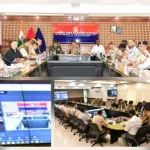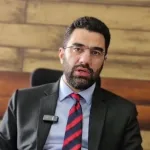The Jammu & Kashmir Students Association (JKSA), here on Monday has launched a meticulously researched and comprehensive report calling for the rationalization of the reservation policy in the Union Territory of Jammu and Kashmir.
The report was launched in collaboration with the J&K Centre for Peace, Research & Sustainable Development (JKCPRS); a Kashmir based Policy Research Institute.
The report was formally launched by the National Convenor of the Jammu & Kashmir Students Association, Nasir Khuehami, along with Chairman Mushtaq Habeeb and Advisor Danish Lone.
They, along with a delegation from the Association, submitted the report to the Chief Minister’s Office and met with Nasir Sogami, Advisor to the Jammu and Kashmir Chief Minister Omar Abdullah, handing over the detailed research report to him. Sogami assured the delegation that “the researched report will be read, reviewed, and taken into consideration for necessary policy action.”
He emphasized that, This groundbreaking researched report offers a sharp and critical analysis of the existing framework, uncovering deep-rooted structural inconsistencies and persistent social inequities. It also presents pragmatic and actionable recommendations aimed at building a more just, inclusive, and equitable system.
He said that, A total of 15 key recommendations have been included in the report. These include conducting a caste-based socio-economic census, sub-categorization within reserved categories, rationalizing the eligibility criteria for the EWS category, restoring the 60:40 ratio between open merit and reserved categories, and several other vital reforms.
Khuehami asserted that, “This report is a roadmap. It traces the evolution of reservation trends in J&K, compares them with national and international benchmarks, and highlights glaring disparities that continue to marginalize large sections of society. There is an urgent need for reforms rooted in equity, social justice, and constitutional morality.”
A 12-member expert committee, chaired by JKSA President Ummar Jamal, led the formulation of the report. The committee includes Faizaan Peer, Danish Lone, Farhat Riyaz, Osheeba Bashir, Adnan Malik, Nazia Israr, Dr. Adil Hussain, Sadiya Farooq Masoodi, Krishna Saproo, Azhar Hassan Mir, Muzamil Ahmad Reshi, and Aamir Akbar; representing a diverse and distinguished pool of academic, legal, and policy professionals.
Khuehami reiterated, “We are not against reservations. Our fight is against a flawed, disproportionate system that has failed to benefit the genuinely deserving and has sidelined meritorious candidates. We advocate for a balanced framework that ensures both upliftment and meritocracy.”
The Association will also reach out to civil society organizations, academic institutions, and student bodies to build a broader consensus for reform. To ensure the process remains inclusive and participatory, the Association will compile a follow-up white paper based on feedback from a wide range of stakeholders, including students, teachers, community leaders, and policy experts. The outreach strategy includes physical meetings, digital town halls, and written submissions to foster open and inclusive dialogue.
The Association stressed that, “This must be a people-centric reform process. No voice should be left unheard. We are committed to reaching every section of society to build a unified call for a rational, transparent, and equitable reservation policy.”
Through this initiative, we are not only challenging systemic flaws but also presenting a constructive path forward. “Social justice cannot be selective,” the Association noted. “A progressive society must uplift the disadvantaged while also honouring merit. We urge the political leadership to rise above vote-bank politics and initiate an honest, inclusive, and transparent review of the existing reservation framework.”
The Association has also called for a temporary slowdown in ongoing recruitment drives in the Union Territory until anomalies in the reservation structure are addressed. “We’re not calling for a complete halt,” the Association clarified. “But continuing recruitment under a flawed system risks grave injustice to open-merit candidates. A temporary pause will provide the necessary time to fix these deep-rooted issues and restore fairness.”








